Breaking News
Surveys on school patronage rolled out ‘in coming weeks’
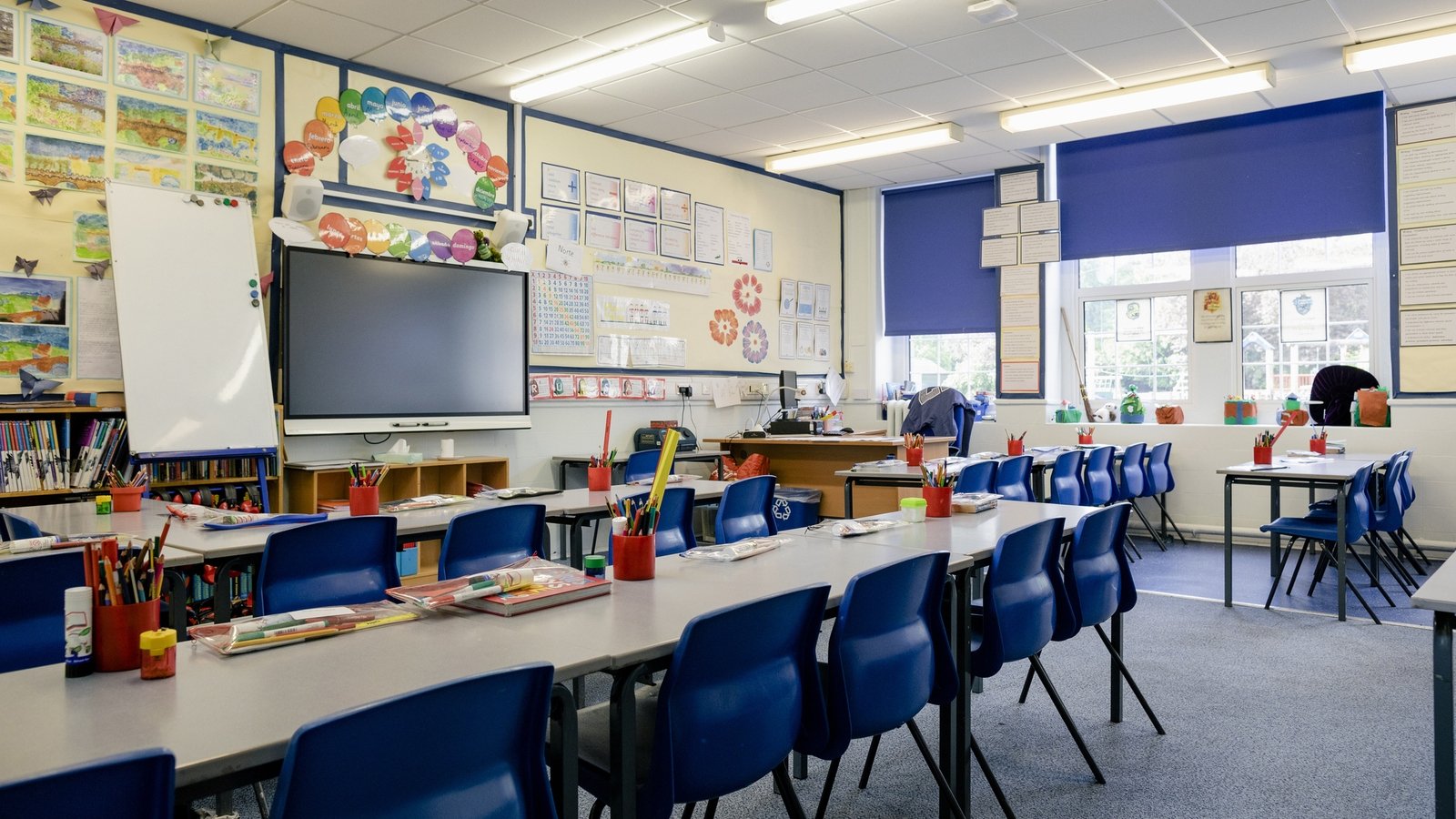
This post was originally published on this site.
Parents of primary and pre-school children are to be surveyed shortly on their preferences when it comes to schools’ ethos and other matters.
Minister for Education and Youth Helen McEntee has confirmed that long awaited surveys, first announced two years ago, will be rolled out “in the coming weeks”.
The questionnaires have been designed as part of a renewed effort by the Department of Education to encourage more Catholic schools to divest to multi-denominational patronage.
An ambitious target was set by the last government to treble the number of multi-denominational schools here by 2030, however barely any progress towards that goal has been achieved.
Currently just 5% of primary schools are multi-denominational, with the remaining 95% run by religious organisations, the vast majority by the Catholic church.
In census 2022, the parents of a quarter of all children under the age of four indicated that they had no religion.
Surveys aimed at capturing the wishes of parents were ready to be rolled out last year just prior to the general election. There has been some frustration among multi-denominational patron bodies regarding the delay.
Asked about the surveys yesterday, Minister McEntee said she was “absolutely determined that we ask parents what their preference is”.
“It’s really important that we get a clear picture and understanding of what parents want, not just in terms of denominational or nondenominational education, but also in relation to single sex or other education and gaelscoileanna”.
“I want to make sure that we have that clarity,” she said.
Outlining the survey plans two years ago, Secretary General of the Department of Education Bernie McNally said parents would complete the questionnaires “in the privacy of their own homes” and that they would have access to accurate information in advance.
She warned that the area was a sensitive one where “sometimes misinformation can thrive”.
The current Programme for Government commits to “seeking to increase choice for parents by ensuring that families can access both multi/non-denominational and faith-based education”.
Falling numbers of primary school age children mean opportunities for the establishment of new multi-denominational schools have declined.
A process known as ‘reconfiguration’ was introduced in 2016 which aimed to meet demand and accelerate the delivery of multi-denominational schools by transferring schools to multi-denominational patrons, with the support of local communities.
However since reconfiguration was first proposed in 2016, just four viable Catholic primary schools have transferred to multi-denominational patronage.
Those schools are in Athlone, Nenagh and Dublin’s inner city.
A small number of tiny rural Catholic schools have also transferred patronage in recent years, but they were all schools with a handful of pupils at risk of imminent closure due to falling enrolment.
Breaking News
Café Sol pesto pasta and chicken recalled over listeria

Read more on post.
The Food Safety Authority has recalled a batch of Café Sol pesto pasta and chicken over the presence of listeria.
The impacted product has a use by date of 25 September 2025 and weighs 224g.
The FSAI said notices will be displayed at point-of-sale and urged those who purchased the product not to eat the affected batch.
Retailers have been requested to remove the pasta dishes from their shelves.
Distributors have been asked to contact their impacted customers, recall the affected batch and also provide a notices in their premises.
Symptoms of listeria monocytogenes infection can include mild flu-like symptoms, or gastrointestinal symptoms such as nausea, vomiting and diarrhoea.
In rare cases, the infection can be more severe, causing serious complications.
Pregnant women, babie, and people with weakened immune systems, including the elderly, are more vulnerable to such infections.
The time between initial infection and first symptoms appearing is on average three weeks but can range between three days and 70 days.
Breaking News
Swinney apologises to injured footballer over ambulance wait
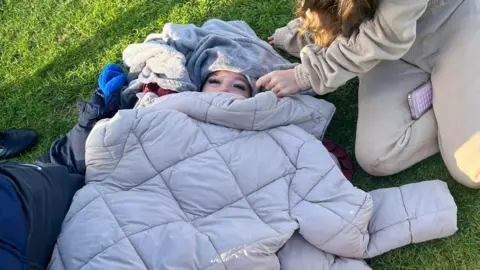
Read more on post.
First Minister John Swinney has apologised to a young footballer who had to wait five hours for an ambulance after breaking her leg.
Brooke Paterson, 19, was injured while playing for Linlithgow Rose away at Cumbernauld United in North Lanarkshire on Sunday.
The central midfielder from Bo’ness, near Falkirk, has since undergone surgery in Forth Valley Hospital.
Speaking in parliament, Swinney apologised to Ms Paterson and expressed his “regret” at the situation.
The Scottish Ambulance Service (SAS) has also apologised for any distress caused by the delay in getting to the match, which it said was due to high demand and hospital turnaround times.
After the case was raised by Scottish Labour leader Anas Sarwar at First Minister’s Questions, Swinney said that it appeared the ambulance call had been misclassified, meaning it did not have “the priority it should have had”.
“That is not acceptable,” he said.
“That is an error that has been made and we have to look into whether that is the case and whether there are other steps that need to be taken to remedy that.”
Sarwar accused Swinney of having “broken the system” and said families across the country were suffering as a result of waits for accident and emergency treatment.
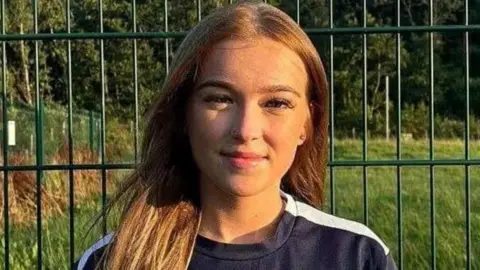 Charlene Paterson
Charlene PatersonMs Paterson said she ran to get the ball at the same time as a United player during the Lowland League match.
“She went for a slide tackle and I got the bad end of it,” she told BBC Scotland’s Drivetime programme.
“It just snapped straight away. I heard the snap and knew something bad happened.
“I just remember being in total agony and screaming and crying. I couldn’t focus – people were trying to talk to me and I couldn’t hear anybody. I was in a lot of pain.”
Teammates and onlookers at Guy’s Meadow Stadium rushed to her aid and several phoned for an ambulance after realising the seriousness of her injury.
“The ambulance said that it wasn’t a 999 emergency and I had to wait,” she said.
“The hours kept adding on and adding on, and I was getting more and more upset and frustrated. I was cold as well because I was lying on the ground.”
People covered her in jackets to keep her warm and comfortable as it got dark.
“I was more annoyed at the fact that they let me lie there on the wet grass, completely freezing with a bad injury,” she added.
“They took their time to come and get me. I just couldn’t believe they could do that to anyone.”
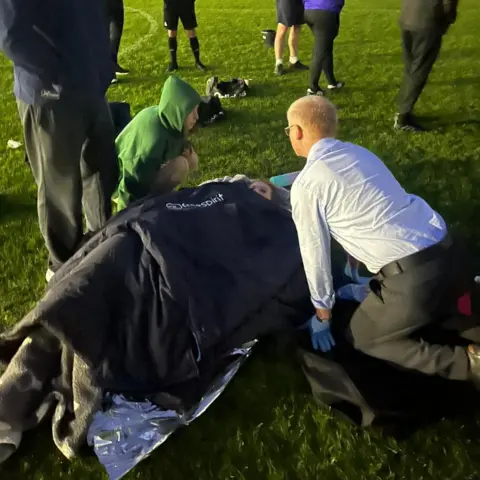 Charlene Paterson
Charlene PatersonWhen asked if the apology from the SAS was enough, she said: “I don’t know.
“I don’t know that they won’t do that to someone else and it’s obviously happened before. An apology isn’t enough to fix these problems.”
It is not known when Brooke will leave the hospital, as she is still struggling with the pain as well as putting weight on the injured leg.
“I’m just really, really sore and tired all the time,” she said.
The footballer said she had suffered bad injuries before, adding: “I know I can come back from something like this, but I know it’s going to take a while.
“I just need to remember why I play football in the first place and that will keep me going. It’ll get hard at points but I can’t give up. I’ve came too far to give up on football now.
“When I’m playing football, all my worries go out the door. I don’t have any problems when I’m playing football. It’s always brought me joy no matter what.”
Ambulance apology
A SAS spokesperson said: “We would like to sincerely apologise to Ms Paterson for the delay in the ambulance response and for any distress caused.
“We can confirm that we received a number of calls on 21 September to attend this incident but due to high demand and hospital turnaround times which ranged between 90 minutes to three hours in the area, this significantly delayed our response and we unfortunately could not attend immediately.
“When a time is appropriate, we would ask Ms Paterson or her family to contact our patient experience team directly so we can look into this case further and personally discuss our response. We hope Ms Paterson is recovering well.”
Breaking News
TB cases in Ireland expected to hit 300 this year

This post was originally published on this site.
The number of tuberculosis (TB) cases in Ireland is expected to hit 300 this year, the highest number since 2018.
Prof Anne Marie McLaughlin from St James’s National TB Centre said the incidence has increased by nearly 30% in the past two years – much of which was due to the increase in homelessness.
“Approximately 60% of our patients are foreign-born, who are living in IPAS centres or experiencing homelessness,” she said.
She explained that 30% of patients are Irish-born who are often immuno-suppressed due to issues such as cancer medications.
Prof McLaughlin said prisons are another area of concern, particularly given Ireland experienced “one of the biggest outbreaks in the world” of TB between 2009 and 2010.
“We can cure TB, and that the really good news story. It is 100% curable.”
However, Prof McLaughlin said additional Government funding was required to introduce a new app which enables her medical team to ensure that patients are taking the medicines they have been prescribed.
“The cost of that is €11,000 per annum for a licence, which is nothing by comparison to the cost of what we previously used – which was public health nurses visiting patients or getting patients to visit them. That cost around €350,000 per annum,” she added.
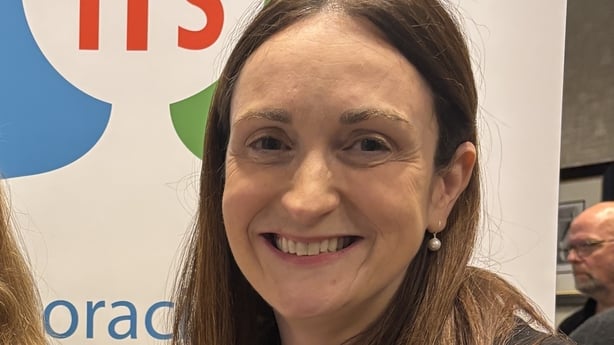
Prof McLaughlin is also seeking funding for a drop-in clinic for patients, given that it is “very hard” for patients who are homeless to abide by scheduled medical appointments.
“If they develop a problem in-between, we’re the only experts who can deal with it. They can’t just go to their local GP because this is really niche stuff,” she said.
Prof McLaughlin was speaking on World Lung Day at an event organised by the Irish Lung Fibrosis Association and fellow organisations,
Lung fibrosis is a life-limiting very serious and progressive condition affecting 5,000 people across Ireland.
Maureen O’Donnell of the ILFA said today’s event in Dublin was to try and raise awareness of the condition.
She said her association is campaigning for “equitable care” so that no matter where patients live in Ireland, they are able to obtain the care they need.
“75% of our patients are not offered pulmonary rehabilitation, which is critical for them to be able to live a longer life,” she said.
If not, she warned, it will take time off their lives.
-
Culture2 days ago
Taylor Swift’s new cinema outing generates more than €12million in just 24 hours
-
Environment1 week ago
Chimps drinking a lager a day in ripe fruit, study finds
-
Politics2 days ago
European Parliament snubs Orbán with vote to shield Italian MEP from Hungarian arrest
-
Culture2 weeks ago
Life, loss, fame & family – the IFI Documentary Festival in focus
-
Health3 days ago
EU renews support for WHO’s Universal Health Coverage Partnership
-
Culture2 days ago
Twilight at 20: the many afterlives of Stephenie Meyer’s vampires
-
Environment5 days ago
Key oceans treaty crosses threshold to come into force
-
Culture2 months ago
Fatal, flashy and indecent – the movies of Adrian Lyne revisited







































